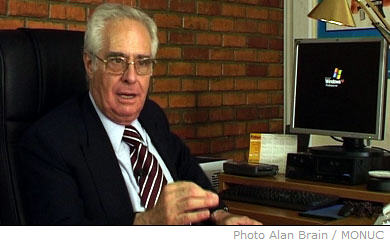Roberto Garreton, consultant for the International Centre for Transitional Justice and former official of the United Nations, is in Kinshasa to evaluate the possibility of establishing a truth and reconciliation commission in the DRC, after years of war. This commission should shine a light on people responsible for war atrocities. 
Interview
What is the object of your visit to the DRC?
I’m here as consultant for the International Centre for Transitional Justice, which is an international NGO which works for justice in post conflict countries, or after war. What we are trying to do is to put in place structures of transitional justice, in collaboration with Congolese civil society and the government.
Here, in DRC, we want initially to see whether there is a true will from the Congolese people to establish a truth and reconciliation commission, which is one of the pillars of transitional justice, and to support the reform of the justice system We also hope to give reparations to the victims.
Is this not a titanic task?
It is true that it is a titanic task, as we are talking about 1965 until today. However, the time-span is enormous, the country is enormous, the victims are in the millions (deaths and disappeared), but it should be done, people need to know the truth and to have reparation for the damage done.
There was already a reconciliation commission during the transition but it did not function, because it did not respect certain international standards. To be a commission of truth and reconciliation, it is necessary to have strong support from civil society.
Who will be part of the commission? Personalities recognized for their moral solidity, be they religious leaders, intellectuals, writers, musicians, philosophers, lawyers and journalists.
It is important that people can make their complaints in all confidence. Here there was only one complaint, which means people did not have confidence in the commission. People should be given the means to make complaints.
Who could finance this commission?
It is necessary that the government does this because this is part of its obligations. If the state and its leaders conceive the public office as a service to the population, and this population asks for truth and justice, there is an obligation on the government.
For that, the population must support the establishment of this institution, and the international community will support it also.
Yes, it is expensive, but all public services are expensive, the parliament is expensive, the presidency of the republic is expensive, justice is expensive, the management of taxes is expensive, then why raise the question of resources only for human rights?
The wounds of war are still fresh. Is it too early to establish such a commission?
One calls upon the goodwill of people. Why? Because if it is not done now, when can it be done?
It is necessary to be attentive, because if it is not done now, it may never be done. One cannot delay a decision of this importance indefinitely.
Is the government ready to collaborate?
Nobody told us the opposite. The most important thing is that there is a political commitment to do it, a strong commitment, a strong will.
How do you evaluate the development of the justice system in the DRC?
I followed this closely when I was the rapporteur for the UN Human Rights commission between 1994 and 2001.
I believe that the recommendations made at that time are still valid. It is necessary to reinforce the capacity of the judiciary. There is the feeling in the population that there is no justice, there is a lack of confidence and this it is a very serious thing.
If there is no justice, there will be no transitional justice, one will not be able to judge the persons responsible for war crimes and to give reparation to the victims.
One should have a superior magistrate’s council which should not only be composed of judges but also by all those who are concerned with justice, for example, experts in human rights, legal presidents and other authorities.







